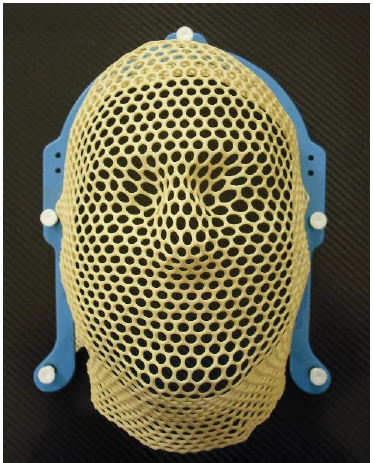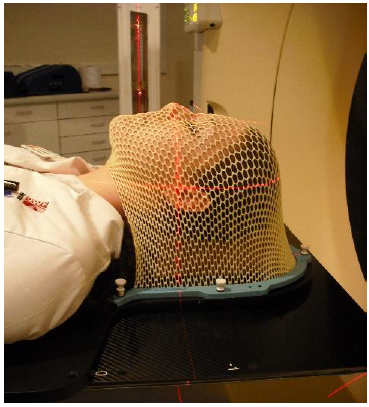Prophylactic Cranial Irradiation (PCI)
Your oncologist has recommended that you have a course of radiotherapy. This page aims to tell you about radiotherapy and what will happen. Please be aware that radiotherapy centres are training areas for doctors, nurses and radiographers. Students may be present in the department but they are supervised at all times. If you would prefer not to have students present during your treatment, please let a member of staff know. You may find it useful to write down some questions before you start your treatment. A space is provided towards the end of this page for you to do so.
Prophylactic – preventative
Cranial – head
Irradiation – radiotherapy
Treatment planning appointment
A shell or mask will be made to help you keep your head still during treatment. You will be placed in the treatment position, usually on your back, with your arms by your sides. If you find this uncomfortable, please do not hesitate to tell one of the team as they may be able to change your position.

The plastic sheet of material used to make your mask will have been warmed in a water bath, so it becomes very flexible. It will then be laid across your face and neck and gently pressed into position around your facial features.

The plastic will feel warm and damp against your skin, but it should not feel uncomfortable. Your mouth and nose will be covered but you will be able to breathe normally through the holes in the plastic.
A well-fitting shell can be difficult to make if you have long hair, a beard or a moustache, so you may be asked to tie your hair back. You may also be asked to shave any facial hair before your planning appointment.
Once the shell or mask has been made, you will then have a CT scan while wearing the shell. This scan is used to plan your treatment accurately.
Radiotherapy treatment
A course of treatment may last from 1 to 2 weeks. At each treatment session, you will wear the mask. The radiographers will position you on the treatment couch in the same position that you were lying during your CT scan.
It is important for you to stay relaxed and still but breathe normally. The radiographers will leave the room to switch on the machine. You will only be alone for a few moments at a time. The radiographers will be watching you on a closed-circuit TV monitor. If you urgently need the radiographers, you can raise your hand to alert them and they will stop the treatment machine and be with you in seconds.
Who will I see and when?
You may see a Clinical Oncologist (doctor), either a consultant or a specialist registrar.
Therapy radiographers are specially trained to use the equipment required to plan and deliver radiotherapy. You will see a team of therapy radiographers at each treatment session. You will have the opportunity every day to discuss any side effects that you have with the radiographers who treat you.
Possible side effects
Side effects usually start off mild and slowly build up during the course of your treatment. They most commonly include:
- Headaches
- Hair loss
- Sickness
- Tiredness (Fatigue)
- Loss of appetite
- Skin reaction
What can I expect after treatment has finished?
Radiotherapy has a delayed effect in which the side-effects will continue even after your treatment has finished. They tend to reach their peak around 7 to 14 days after your last radiotherapy session, so do not be alarmed if they worsen.
Recovery times vary from person to person, but side-effects should gradually improve over the following 6 to 12 weeks.
In the weeks following your treatment, you will be reviewed by the specialists that have been looking after you. This will vary depending on your diagnosis and treatment regimen, but you will be advised about this by your treatment team.
Everyone is different and may react differently to treatment. If at any point, after you have finished treatment, you are concerned about anything, please contact your radiotherapy department (your will be given the contact details) or your GP.
It is not unusual for people to be anxious and it might be better to seek advice rather than worry. If you need urgent help out of normal working hours, please contact NHS 111 for advice.
Further information
Please see Roy Castle Lung Foundation booklet ‘Radiotherapy for lung cancer’ for further information.
Website: https://roycastle.org/help-and-support/lung-cancer-information/
Your data
All personal images and photographs taken during your radiotherapy treatment will be used in accordance with the local Trust policy on the protection and use of patient information.
For more information about Gloucestershire Hospitals NHS Foundation Trust’s Privacy Policy, please visit the following website: